"RELEASING THE
POTENTIAL"
 FISH TIMBER
& DIAMONDS FISH TIMBER
& DIAMONDS |
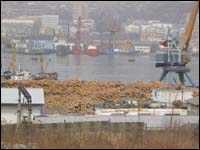
The timber industry is one of Primorsky Krai's
oldest, concentrating on the export of larch,
birch and ash. Among the companies involved in
processing for international markets are Terneyles,
which manufactures timber products in the northeast
of Primorsky Krai and Oceaninterbusiness that
specializes in shipping and trading timber to
Asian and external markets from Siberia. The President
Mr Viktor A. Klus believes that Primorsky Krai
should not forsake its neighboring Asian markets.
"Last year China consumed 40 million cubic
meters of Russian timber. Let me remind you that
the consumption of Japan amounts to 4.5 million
cubic meters only. China is a huge market and
one we should pay more attention to."
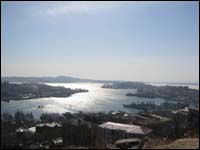
Fishing was at the heart of Primorsky Krai in
Soviet times, when the region accounted for two
thirds of the USSR's fishing industry. Even now,
with difficulties over quota allocations and over
fishing, a quarter of all local people work in
the industry, and fish products are sold all over
the Far East, including Moscow, Asian and European
markets and the sector is still considered to
be extremely important "One in every four
people work within the fishing sector of Primorsky
Krai, including one member of every three families
is connected to the sector." Says Mr. M Loginov,
President of Vladivostok Fish Processing Plant
JSC.
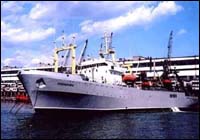
The industry's status as a political hot potato
cannot at present be doubted. Former governor Yevgeny
Nazdratenko was recently suspended from his post
as chairman of the State Fisheries Committee in
a wrangle over quotas with present governor Sergei
Darkin, himself a director of a fishing company
before election.
Fishing companies buy most of their quotas at government
auctions, but a small percentage are allocated free
of charge by regional authorities. These have to
be approved by the State Fisheries Committee, but
former chairman Yevgeny Nazdratenko recently refused
to sign a list drawn up by Governor
Sergei Darkin, amid accusations of cronyism.
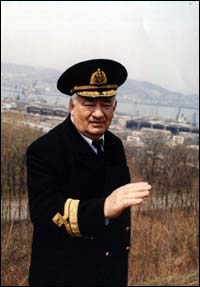
According to Nazdratenko, each boat for the fishing
company Roliz, where Darkin has shares, received
a license to catch up to 2,583 metric tons of Pollack
- the most received by any of the companies - while
one of the oldest companies in the region, Nakhodka's
Base of Active Marine Fisheries, (BAMR) was
limited to only 650 metric tons per boat and a further
seventy-two companies got no free quotas at all.
In a recent interview Mr.
Anatoly N Kolesnichenko, General Director of
BAMR
reflected on the situation of his company in former
years, "Our company used to fish 10% of the
whole catch in the Russian Far East!" he also
added that "times were changing" and proceeded
to stipulated his objections to the introduction
of the fishing auction system. "The fishing
industry is experiencing some transformations that
are not always useful, auction's mean selling uncaught
fish, in other words the intention to catch fish
is sold based on scientific forecasts, which are
far from being the best or accurate. Science lags
behind the times. The abundance of fish is influenced
by lots of factors in the sea that cannot be predicted
and presented accurately by science." States
Mr. Kolesnichenko.
|
Darkin's press secretary
defended the governor, saying the quotas were allocated
on the basis of taxes paid by each company, the
size of their wage packets, and the number of poaching
offences.
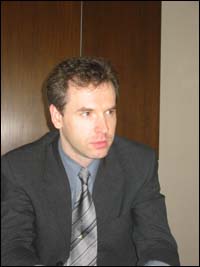
Among other local seafood companies are Vostok-1,
based in Vladivostok, a company that specializes
in catching king crab and producing related products.
At present it is continuing to expand its Primorye
base internationally and has 19 vessels of different
type and capacity "we have 5 daughter companies
and we are represented in the markets of USA, Hong
Kong, Japan, Korea, Portugal and Canada." Says
Mr. Alexander A Perednya, Chairman of Vostok 1.
Fishing quotas are not however the only problem
that blights the industry at the moment as expansion
plans are also hindered by global economics. "Our
main markets for export are Korea, Japan and the
USA, but unfortunately the latest tragic events
connected with the terrorism off course have influenced
the economy greatly. As our fish production is elite
but when there is war behind your door you do not
think about diamonds you think about bread."
Says Perednya.
Turnif another local and well known fishing
company, owns a fleet of 8 large fishing ships
and works with companies in North America and
Asia, producing fish fillets and mince, crab frozen
in brine, caviar, with an annual catch of around
60,000 tons of seafood, and Poseidon, which produces
scallops, halibut and sells live crab, herring
and in Japan, while Vladivostok Fish Processing
Plant makes products for local consumption, such
as tinned mussels and dried squid tentacles, making
up 30 percent of sales of fish products in Primorsky
Krai.
 NEW TIMES
NEW MARKETS NEW TIMES
NEW MARKETS |
Diamond processing is a promising new area for
Primorsky Krai, since the stones are mined in
Yakutia to the northeast, a remote area with poor
transport links to Asian markets. A pioneer in
the field is Primorsky Diamond, an affiliate of
India's Choron Diamond, which opened a diamond-polishing
factory in Vladivostok in March 2003 with an initial
investment of approximately 1 million dollars.
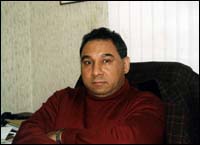
Using diamonds from the Sakha Republic in Russia,
and machinery and specialists from India, the
company will train employees, and the cut stones
will be exported to Hong Kong, Singapore and Japan.
The company is also considering opening a jewelry
factory in the city and selling directly to Japanese
tourists.
Choron Diamond opened a diamond polishing factory
in Yakutsk, Sakha Republic, in 1999, but needed
a less remote location for convenient exporting.
Mr. Gandhi anticipates that business in Choron
Diamond will increase by at least 20 % thanks
to exports of diamonds from Vladivostok.
"We needed to be closer the Asian market,
and we found out that Vladivostok was the best
city in Russia to be in touch with our Asian clients
easily. It is very accessible, the infrastructure
and facilities are improving and there is a good
labor force as well, so it was a natural choice
to establish ourselves in Vladivostok," says
general director Sunhil.C.Gandhi.
"Accessibility was a major argument, and
the region promises to develop quickly in the
next five years. Everybody is looking for new
opportunities in the Russian Far East, and that
is Vladivostok," says Gandhi.
The general director also praises support from the
regional administration: "One of the reasons
we are here is that the government is supporting
us in every way possible, so we feel that we can
also serve as a model for future investments in
the region."
Describing Darkin as "very,
very helpful," Gandhi said the governor promised
to help out in any difficulties.
"Here we are a major investor in relative
terms, so we receive a great deal of attention
and respect that we might not receive in another
country," believes Gandhi.
|

